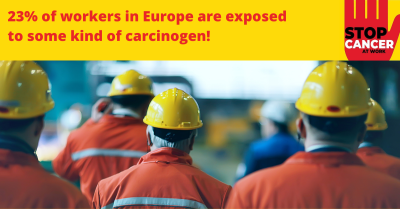Action needed to prevent work-related cancer will continue until at least 2028 under an agreement signed today by trade unions, businesses and member states.
Cancer is the leading cause of work-related deaths in the EU with over 100,000 cancer deaths each year.
The Roadmap on Carcinogens was launched in 2016 in an effort to tackle this scandal, leading to the introduction of safer exposure limits on dozens of dangerous substances commonly found in workplaces.
Today it was agreed that the scheme will be renewed for a third time, meaning action will continue until at least 31 December 2027.
The commitment was included in a covenant signed by the ETUC, Business Europe, the EU Commission, and 11 member states at a high-level event organized by the Belgian presidency.
The Roadmap is a non-legislative initiative aimed at ensuring protections enshrined in legislation are implemented in the workplace. Pressure from trade unions is a major factor in driving prevention measures and guaranteeing employers deliver on their duty to ensure the health and safety of their employees regardless of where they work.
Speaking at today's event, ETUC Confederal Secretary Giulio Romani said:
“Since 2019, we have witnessed five successive revisions of the Carcinogens Directive, the extension of its scope, and the adoption or updating of mandatory limit values for occupational exposure to 29 carcinogenic substances and 12 reprotoxic substances.
“A 6th batch is currently in the pipeline, with the consultation with social partners already concluded. This batch will include binding occupational exposure limits for welding fumes, polycyclic aromatic hydrocarbons, isoprene, 1,4-dioxane, and cobalt and inorganic cobalt compounds. Additionally, the Directive on asbestos at work has been reviewed, introducing a more protective binding occupational exposure limit, a new methodology for measuring asbestos at the workplace, among other improvements.
“The key demand for the next legislative term of the European institutions is to continue advancing legislation and ensuring its implementation at the workplace to protect workers against dangerous substances. The European trade union movement stands united in rejecting a return to policies that penalize working people.
“Such measures would negatively impact workers' rights, safety and health protections, the economies of EU member states, and their readiness to confront the dual challenges of the digital and green transitions. We are already witnessing some of these deregulation and austerity practices, with the adoption of the new financial governance rules and the decision of the European Commission to withdraw the legislative initiative on the screening of asbestos in buildings from the agenda of the College of Commissioners.
“Also, reflection will be needed on how to expedite the procedure to enact legislation protecting workers against dangerous substances, which includes reinforcing the European Chemical Agency and better allocating its resources.”

